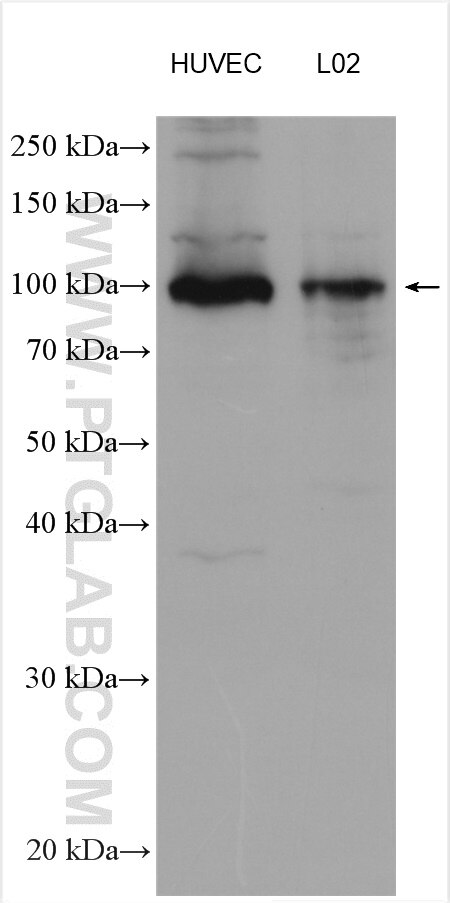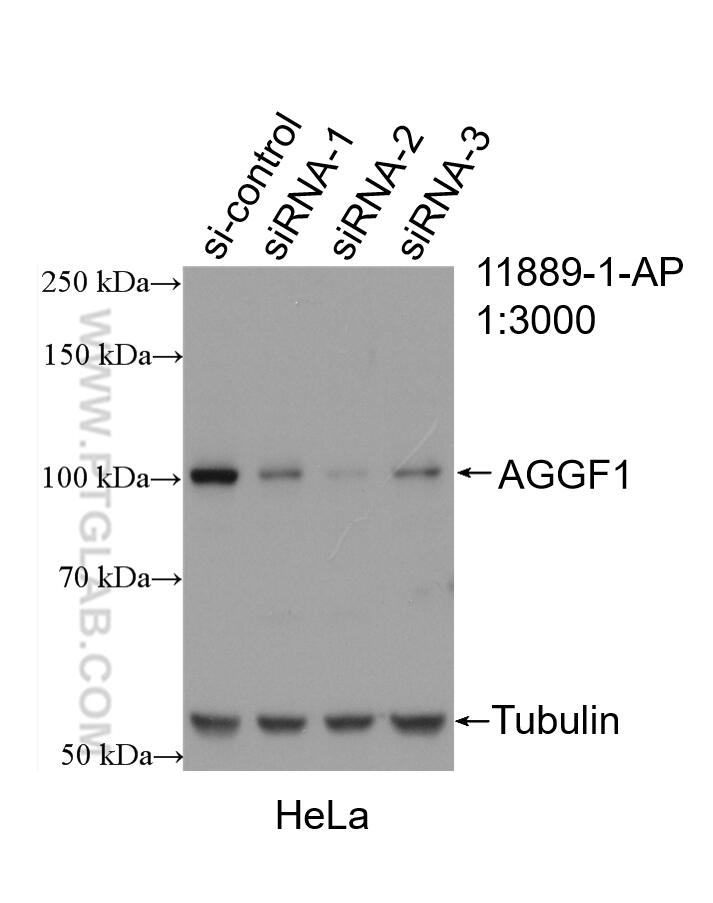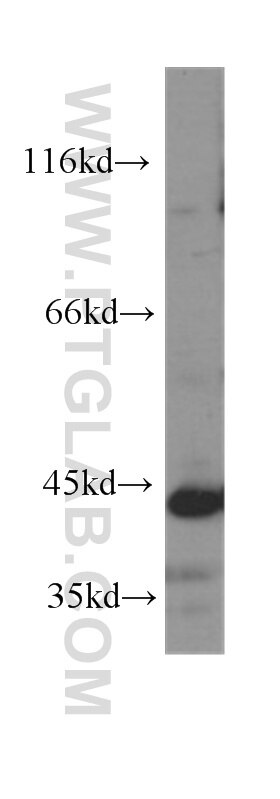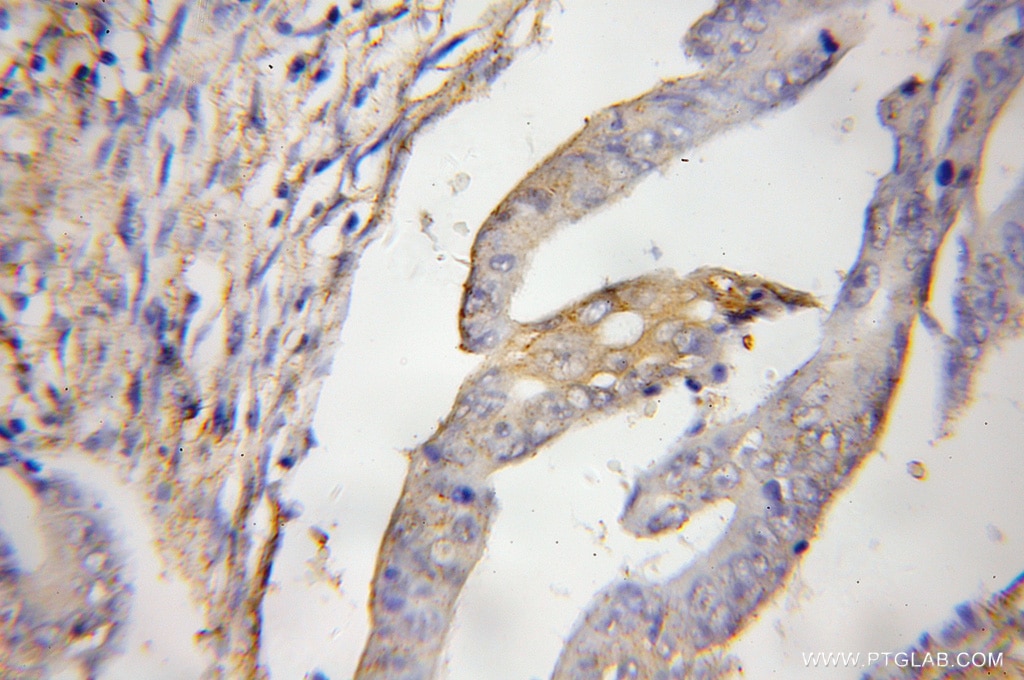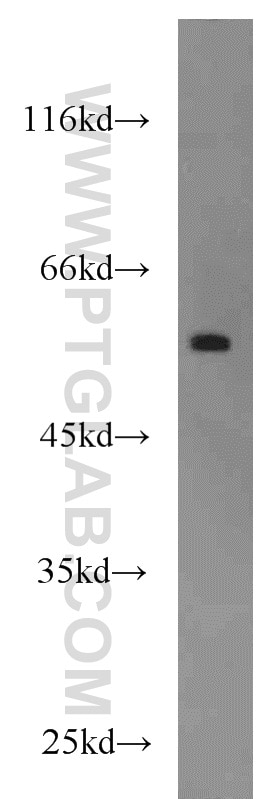- Phare
- Validé par KD/KO
Anticorps Polyclonal de lapin anti-AGGF1
AGGF1 Polyclonal Antibody for WB, ELISA
Hôte / Isotype
Lapin / IgG
Réactivité testée
Humain, rat, souris et plus (3)
Applications
WB, IP, IF, IHC, ELISA
Conjugaison
Non conjugué
N° de cat : 11889-1-AP
Synonymes
Galerie de données de validation
Applications testées
| Résultats positifs en WB | cellules HUVEC, cellules HeLa, cellules L02 |
Dilution recommandée
| Application | Dilution |
|---|---|
| Western Blot (WB) | WB : 1:1000-1:8000 |
| It is recommended that this reagent should be titrated in each testing system to obtain optimal results. | |
| Sample-dependent, check data in validation data gallery | |
Applications publiées
| KD/KO | See 8 publications below |
| WB | See 18 publications below |
| IHC | See 8 publications below |
| IF | See 5 publications below |
| IP | See 1 publications below |
Informations sur le produit
11889-1-AP cible AGGF1 dans les applications de WB, IP, IF, IHC, ELISA et montre une réactivité avec des échantillons Humain, rat, souris
| Réactivité | Humain, rat, souris |
| Réactivité citée | rat, Humain, poisson-zèbre, souris, singe Rhésus, Macaque |
| Hôte / Isotype | Lapin / IgG |
| Clonalité | Polyclonal |
| Type | Anticorps |
| Immunogène | AGGF1 Protéine recombinante Ag2497 |
| Nom complet | angiogenic factor with G patch and FHA domains 1 |
| Masse moléculaire calculée | 714 aa, 81 kDa |
| Poids moléculaire observé | 84-100 kDa |
| Numéro d’acquisition GenBank | BC029382 |
| Symbole du gène | AGGF1 |
| Identification du gène (NCBI) | 55109 |
| Conjugaison | Non conjugué |
| Forme | Liquide |
| Méthode de purification | Purification par affinité contre l'antigène |
| Tampon de stockage | PBS avec azoture de sodium à 0,02 % et glycérol à 50 % pH 7,3 |
| Conditions de stockage | Stocker à -20°C. Stable pendant un an après l'expédition. L'aliquotage n'est pas nécessaire pour le stockage à -20oC Les 20ul contiennent 0,1% de BSA. |
Informations générales
The angiogenic factor gene, AGGF1 (or VG5Q), is identified as a candidate susceptibility gene for Klippel-Trenaunay syndrome (KTS) which is a severe congenital disorder characterized by capillary malformations, venous malformations or varicose veins, and hypertrophy of the affected tissues. AGGF1 protein can bind to endothelial cells and promote cell proliferation. AGGF1 shows strong expression in blood vessels and is secreted as vessel formation is initiated. Regulation of AGGF1 by GATA1 may play roles in endothelial cell biology and angiogenesis. Catalog#11889-1-AP was validated by KO and KD methods in scientists' studies (PMID: 28153879; 27513923), and the observed MW is 84 kDa.
Protocole
| Product Specific Protocols | |
|---|---|
| WB protocol for AGGF1 antibody 11889-1-AP | Download protocol |
| Standard Protocols | |
|---|---|
| Click here to view our Standard Protocols |
Publications
| Species | Application | Title |
|---|---|---|
Nat Commun A non-canonical pathway regulates ER stress signaling and blocks ER stress-induced apoptosis and heart failure. | ||
Mol Ther The 3' Untranslated Region Protects the Heart from Angiotensin II-Induced Cardiac Dysfunction via AGGF1 Expression. | ||
PLoS Biol Angiogenic Factor AGGF1 Activates Autophagy with an Essential Role in Therapeutic Angiogenesis for Heart Disease.
| ||
Arterioscler. Thromb. Vasc. Biol. Angiogenic Factor With G Patch and FHA Domains 1 Is a Novel Regulator of Vascular Injury.
| ||
Mol Ther Nucleic Acids circ-SHKBP1 Regulates the Angiogenesis of U87 Glioma-Exposed Endothelial Cells through miR-544a/FOXP1 and miR-379/FOXP2 Pathways. | ||
FASEB J Angiotensin II increases angiogenesis by NF-κB-mediated transcriptional activation of angiogenic factor AGGF1. |
